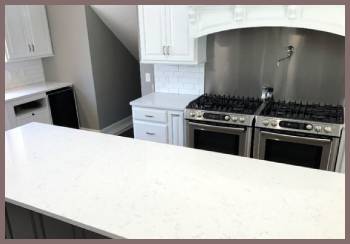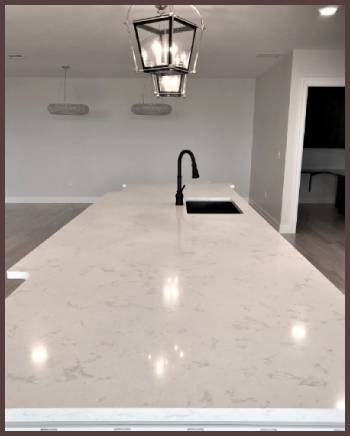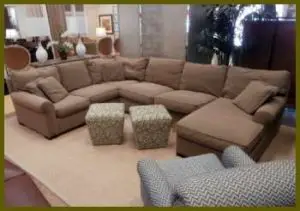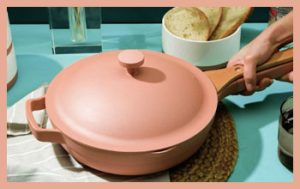There’s no denying that your kitchen countertops play a vital role in the overall aesthetic and functionality of your space. With so many options on the market, making a decision can feel overwhelming. One popular choice that has been garnering attention is Cambria Swanbridge, a quartz countertop material that offers a stunning and durable option for homeowners.
In this comprehensive Cambria Swanbridge review, we’ll cover the pros and cons of this countertop choice and answer some frequently asked questions.
The Pros: What Makes Cambria Swanbridge Stand Out

- Aesthetically Pleasing Design
Cambria Swanbridge is known for its elegant and timeless design, featuring a subtle blend of white and gray with a hint of sparkle. This gives it the ability to complement various kitchen styles, from traditional to contemporary. Its versatility makes it a popular choice for homeowners looking for a countertop material that will enhance their kitchen’s overall design.
- Durability and strength
One of the major selling points of Cambria Swanbridge is its durability. Made from 93% natural quartz, it’s one of the hardest minerals on Earth, making it incredibly resistant to chips, scratches, and stains. This means that your countertops will maintain their pristine appearance for years to come, without the need for constant maintenance.
- Easy Maintenance
Speaking of maintenance, Cambria Swanbridge is an excellent choice for busy households, as it requires very little care. Unlike natural stone countertops, which require periodic sealing, Cambria Swanbridge is non-porous and doesn’t require any sealing or polishing. A simple wipe-down with a damp cloth and mild soap is all it takes to keep your countertops looking their best.
- Eco-friendly Manufacturing Process
Cambria is committed to producing environmentally friendly products, and their manufacturing process reflects this. The company recycles all of the water used during production and uses sustainable practices to reduce waste. By choosing Cambria Swanbridge, you’re not only investing in a beautiful and durable countertop material but also contributing to a greener future.
Read More: About Mont Quartz
The Cons: Potential Drawbacks to Consider

- Cost
One of the main drawbacks of Cambria Swanbridge is its cost. While it’s true that you’re paying for a high-quality, long-lasting product, the price tag can be a bit intimidating for some homeowners. However, it’s essential to weigh the long-term benefits, such as durability and low maintenance, against the initial investment.
- Heat Sensitivity
Although Cambria Swanbridge is highly resistant to scratches and stains, it is not immune to heat damage. Placing hot pots and pans directly onto the surface can cause discoloration or cracking. To protect your countertops, it’s important to use trivets or hot pads when dealing with hot cookware.
- Limited Outdoor Applications
While Cambria Swanbridge is an excellent choice for indoor countertops, it’s not recommended for outdoor applications. Prolonged exposure to direct sunlight can cause discoloration and other damage to the material. If you’re looking for a countertop option for an outdoor kitchen, you may need to consider other materials.
Which is better: granite or Cambria?
Both granite and Cambria quartz countertops have their advantages and drawbacks. Granite is a natural stone, which means each slab is unique and has a distinct appearance. However, it requires periodic sealing to prevent staining and is more prone to chipping and cracking compared to Cambria.
Cambria, on the other hand, is a highly durable and low-maintenance option. It is non-porous, which means it doesn’t require sealing, and is resistant to stains and scratches. However, it tends to be more expensive than granite and is not suitable for outdoor applications.
Ultimately, the decision between granite and Cambria countertops depends on your personal preferences, budget, and the specific needs of your household.
Read More: Comparison Between Cristallo Quartzite And Taj Mahal Quartzite
Frequently Asked Questions (FAQs)
Cambria Swanbridge features a soft, elegant blend of white and gray, with subtle hints of sparkle. This neutral color palette allows it to complement a variety of kitchen designs and styles.
Cambria is a reputable and trusted brand known for producing high-quality quartz countertops. They offer a wide range of colors and designs to suit various tastes and preferences. Cambria countertops are known for their durability, easy maintenance, and eco-friendly manufacturing process.
Given the neutral color palette of Cambria Swanbridge, you have plenty of options when choosing a backsplash. Some popular choices include white subway tiles, marble or glass mosaic tiles, and even a complementary solid color. Ultimately, the choice depends on your personal taste and the overall design of your kitchen.
Cambria Swanbridge is a quartz countertop material produced by Cambria, a leading manufacturer of premium natural quartz surfaces. It is known for its elegant design, featuring a blend of white and gray with a hint of sparkle. Cambria Swanbridge is highly durable, resistant to stains and scratches, and requires minimal maintenance.
Cambria countertops, including Swanbridge, are highly resistant to scratches thanks to their composition, which is 93% natural quartz. Quartz is one of the hardest minerals on Earth, making Cambria countertops an excellent choice for busy households where durability is a top priority.
In Conclusion
When considering Cambria Swanbridge for your kitchen countertops, it’s essential to weigh the pros and cons to determine if it’s the right fit for your home. With its beautiful design, durability, and easy maintenance, it’s easy to see why so many homeowners are drawn to this elegant option. However, the higher cost and heat sensitivity are factors that should be taken into account.
By understanding the strengths and weaknesses of Cambria Swanbridge, you can make an informed decision and enjoy a beautiful and functional kitchen that suits your needs and preferences.



